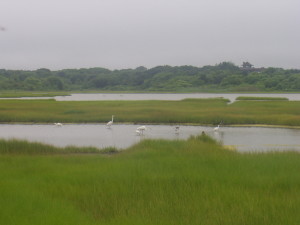I learned ecology tramping around the salt marshes of Cape Cod in the early 1970’s, where I was a graduate student in the Boston University Marine Program in Woods Hole, Massachusetts. At that time the word “ecology” was mostly accompanied by “the science of,” and was only beginning to be adopted as the calling card for the then-nascent environmental movement.
Our ecology class spent long days at the Sippewisset Marsh tramping through microbial mats built on cyanobacteria, diatoms, and algae, as well as tough Spartina grasses that could withstand salt water and an incredible array of intertidal organisms supported by the twice-daily ebb and flow of the tide.
We used the word “web” incessantly, not as in “world wide web” but as in the “web of life.” There were just so many living things dependent on the marsh. Its high productivity was at the base of innumerable food chains, in the marsh itself and downstream as inhabitants were swept out into the ocean and fed upon by small fish that themselves were eaten by larger species. The three building blocks of biological interaction, predation, competition and symbiosis, were ubiquitous; everything was interacting and interrelated.
Our holy scientific grail was to perfect models explaining how organisms depended on each other, from the tiniest of bacteria to the largest of whales. The wave of ecologists from that generation transformed our understanding of ecology from observation-based natural history to a rigorous professional practice. Today ecology is a sophisticated science, and startling in the predictive capacity of its models.
The trend then was to organize information and find patterns. Today that continues, but ecologists also are emerging at the forefront of environmental policy by calculating dollar values on the services that habitats provide.
Numbers abound; forests are worth so many gazillion dollars for their carbon-sequestering services, marshes are valued financially for supporting shrimp fisheries, and wild bees considered to be worth tens of billions of dollars for their crop-pollinating services.
The valuations determined by ecological service models are useful in providing an economic rationale for preserving or restoring habitats, but the dollar values can be low or high depending on the assumptions and inputs ecologists put into their models. For example, the ecological costs of a pipeline will vary dramatically depending on whether climate change is considered a cost, on whether we economically value side effects such as restricted migratory routes for moose that disrupt subsistence hunting and on lost opportunity costs such as reduced tourism.
The idea of valuating common resources and charging industry appropriately for their use of ecosystem services may be a useful bridge between left and right positions on the political spectrum. For example, an eloquent spokesperson for charging industry a fee for its use of water is Preston Manning, a conservative Canadian politician best known for starting a right-wing political party and for his conservative think tank. Yet, he has proposed that we calculate the value of water as an ecosystem service in Alberta, billing the oil industry for its water use and for cleaning up pollution downstream from the Alberta tar sands.
Acid rain is another good example. When lake acidification became evident to ecologists, and the value of the ecosystem services provided by lakes made clear, it was the Conservative Mulroney government in Canada and the Republican Bush administration in the U.S. that forced industry to scrub airborne pollutants from their smokestacks.
Almost any ecosystem or service is amenable to economic valuation, but ultimately it’s values rather than valuation that determine how serious we are about protecting ecological resources. Whether we use solar power or oil for energy, managed honeybees or wild bees for pollination, farmed or wild salmon for food, depends more on how we want to live in the world than on any dollar amount we might ascribe to nature’s services.
Whether we exploit or harmoniously partner with nature may be the most fundamental decision we face in the 21st century. Ecologists are increasingly adept at telling us the costs and consequences of exploitation and the advantages and benefits of ecological partnerships, but knowledge is not worth much in a vacuum.
To take ecosystem services with the seriousness they deserve, we need to recognize that our prosperity and even survival depend on collaborating with nature as a partner rather than as a resource to extract, exploit and discard. Similarly, we might find that forging political collaborations across party lines around ecosystem issues might heal some of the deep animosity and gridlock that pervade politics today.
If we can do that, then our values and our valuations might converge, to our benefit and the benefit of the planet on which we coexist.
